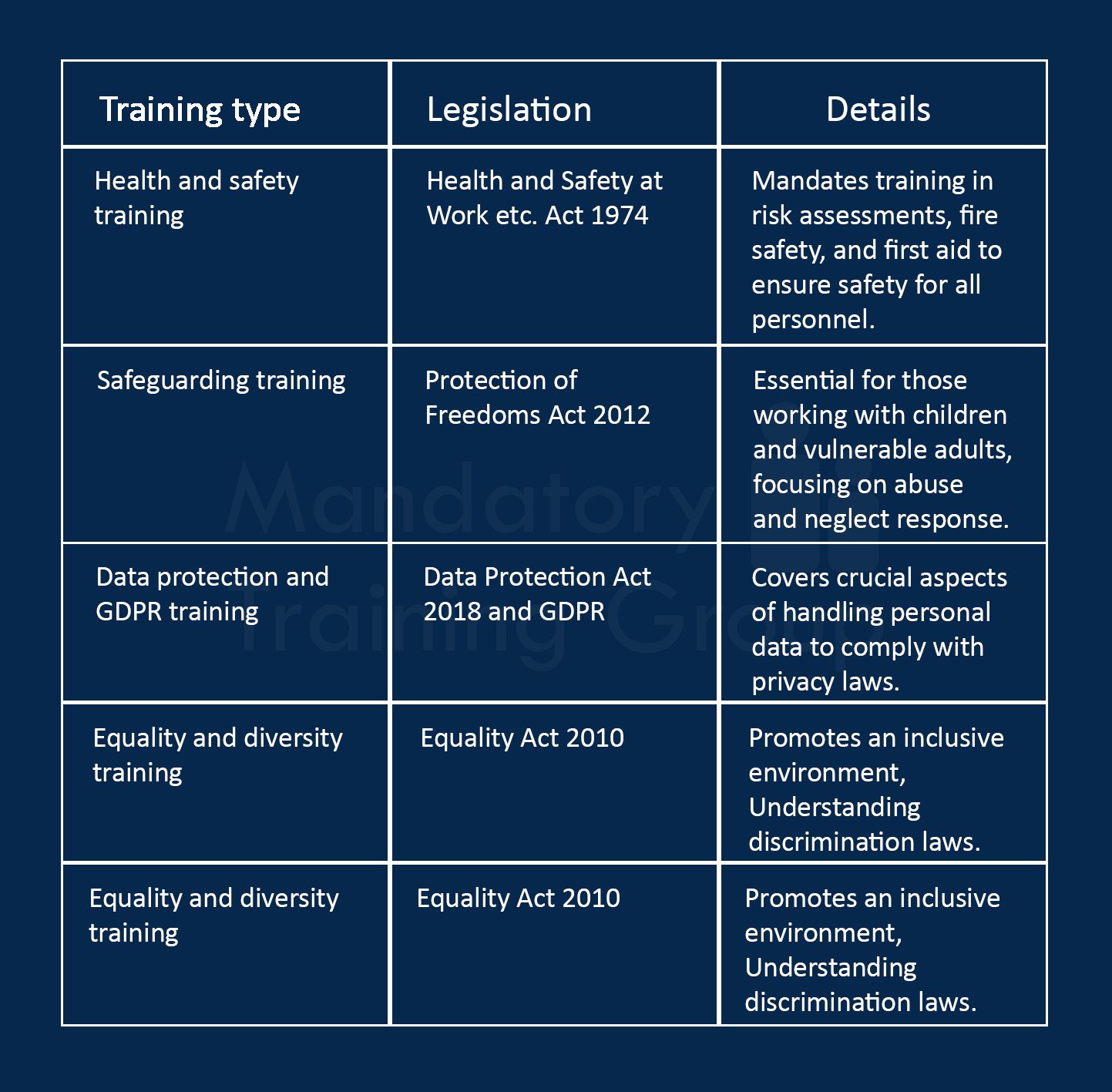Statutory and mandatory training requirements for charities
Enhancing charity operations: Understanding statutory and mandatory training requirements
By Dr Richard Dune

Image by drazenphoto via Envato Elements
Adhering to statutory and mandatory training requirements is not just a regulatory necessity in the UK charitable sector but a cornerstone of operational excellence. Charities must operate within a strict legal framework, ensuring safety, equality, and integrity in all aspects of their work. In this blog, Dr Richard Dune explores the critical training requirements that UK charities must meet, shedding light on relevant legislation, regulations, and best practices to maintain compliance and promote a productive working environment.
Statutory and mandatory training requirements for charities
Enhancing charity operations: Understanding statutory and mandatory training requirements
By Dr Richard Dune

Image by drazenphoto via Envato Elements
Adhering to statutory and mandatory training requirements is not just a regulatory necessity in the UK charitable sector but a cornerstone of operational excellence. Charities must operate within a strict legal framework, ensuring safety, equality, and integrity in all aspects of their work. In this blog, Dr Richard Dune explores the critical training requirements that UK charities must meet, shedding light on relevant legislation, regulations, and best practices to maintain compliance and promote a productive working environment.

Image by Rawpixel Envato Elements
Key facts and statistics
Effective training in the charity sector is not merely about compliance; it's about building a foundation for better service delivery and enhanced staff and volunteer engagement. studies show that well-trained teams are 70% more likely to report job satisfaction and are significantly less likely to face legal or regulatory penalties. in the context of charities, where resources can be limited, optimising training is an essential strategy for maximising impact.
Understanding the training requirements
Understanding the training requirements for charities is crucial for ensuring compliance and operational excellence. Statutory training encompasses the courses that charitable organisations are legally mandated to provide. This ensures that they meet specific legal standards critical for their operations. Mandatory training, on the other hand, includes not only these compulsory elements but also encompasses internal policies and best practices that a charity identifies as vital for maintaining safety and efficiency in their work. These combined training elements form the backbone of a robust framework, enabling charities to operate effectively and ethically within their regulatory environments.

Image by Prostock-studio via Envato Elements

Image from The Mandatory Training Group
Relevant legislation and regulations
See the table for an overview of the key training types and their associated legislation within various sectors. It highlights the legal mandates for each training, aiming to ensure compliance, enhance safety, and promote inclusivity across diverse professional environments.
Charity Commission expectations
While not prescribing specific courses, the Charity Commission expects charities to adhere to their legal obligations and manage risks effectively through training. Key areas include:
- Trustee induction and ongoing training - To understand their legal responsibilities and the charity's specific needs.
- Financial management and accountability - Ensuring the charity's assets are protected and legally utilised.
- Conflict of interest management - Essential for ethical governance.
- Fundraising training - Adherence to legal requirements and ethical standards in fundraising practices.

Image by ASphotostudio via Envato Elements

Image by BGStock72 via Envato Elements
Best practice recommendations
Charities are advised to go beyond the minimum legal requirements and invest in training that bolsters resilience and service quality:
- Volunteer management training - Focuses on effective strategies for volunteer engagement and retention.
- Specific role-related training - Tailored to the needs of specific positions within the charity.
- Crisis management and business continuity - Prepares organisations to handle unexpected challenges efficiently.
Implementing effective training
To ensure training is impactful, charities should consider the following recommendations:
- Regularly update training programs - To keep pace with legislative changes and emerging best practices.
- Use blended learning approaches - Combine online and face-to-face training to maximise learning outcomes.
- Evaluate training effectiveness - Regular assessments to refine training approaches and ensure compliance.

Image by Pressmaster via Envato Elements

Image by YuriArcursPeopleimages via Envato Elements
Conclusion - Essential training requirements for charities
In the complex landscape of charity operations, rigorous training isn't just beneficial - it's imperative. Implementing robust statutory and mandatory training programs is not merely about fulfilling legal obligations; it's about forging a path to operational excellence and fostering an environment of proactive compliance and ethical governance. Effective training equips staff and volunteers with the necessary tools to meet the needs of those they serve and do so with the highest standards of safety, integrity, and inclusivity.
Moreover, training transforms organisational culture. It builds a knowledge framework that enhances decision-making and empowers teams, reducing risks and boosting overall efficiency. For charities, where every resource counts and public trust is paramount, investing in high-quality training means investing in your organisation's future and the communities you support. This strategic approach ensures that your charity is a compliant entity and a thriving, dynamic force for good.
Charity staff training with ComplyPlus LMS™
Are you committed to elevating your charity to new heights of proficiency and care? Embrace the comprehensive charity management training solutions offered by ComplyPlus LMS™. Our platform provides a wide array of elearning courses specifically tailored to meet the challenges and requirements of the charitable sector.
*All our courses are externally peer-reviewed and accredited by the CPD Certification Service.

Image by AydinovKamran via Envato Elements
Key facts and statistics

Image by Rawpixel Envato Elements
Effective training in the charity sector is not merely about compliance; it's about building a foundation for better service delivery and enhanced staff and volunteer engagement. studies show that well-trained teams are 70% more likely to report job satisfaction and are significantly less likely to face legal or regulatory penalties. in the context of charities, where resources can be limited, optimising training is an essential strategy for maximising impact.
Understanding the training requirements

Image by Prostock-studio via Envato Elements
Understanding the training requirements for charities is crucial for ensuring compliance and operational excellence. Statutory training encompasses the courses that charitable organisations are legally mandated to provide. This ensures that they meet specific legal standards critical for their operations. Mandatory training, on the other hand, includes not only these compulsory elements but also encompasses internal policies and best practices that a charity identifies as vital for maintaining safety and efficiency in their work. These combined training elements form the backbone of a robust framework, enabling charities to operate effectively and ethically within their regulatory environments.
Relevant legislation and regulations

Image from The Mandatory Training Group
See the table for an overview of the key training types and their associated legislation within various sectors. It highlights the legal mandates for each training, aiming to ensure compliance, enhance safety, and promote inclusivity across diverse professional environments.
Charity Commission expectations

Image by ASphotostudio via Envato Elements
While not prescribing specific courses, the Charity Commission expects charities to adhere to their legal obligations and manage risks effectively through training. Key areas include:
- Trustee induction and ongoing training - To understand their legal responsibilities and the charity's specific needs.
- Financial management and accountability - Ensuring the charity's assets are protected and legally utilised.
- Conflict of interest management - Essential for ethical governance.
- Fundraising training - Adherence to legal requirements and ethical standards in fundraising practices.
Best practice recommendations

Image by BGStock72 via Envato Elements
Charities are advised to go beyond the minimum legal requirements and invest in training that bolsters resilience and service quality:
- Volunteer management training - Focuses on effective strategies for volunteer engagement and retention.
- Specific role-related training - Tailored to the needs of specific positions within the charity.
- Crisis management and business continuity - Prepares organisations to handle unexpected challenges efficiently.
Implementing effective training

Image by Pressmaster via Envato Elements
To ensure training is impactful, charities should consider the following recommendations:
- Regularly update training programs - To keep pace with legislative changes and emerging best practices.
- Use blended learning approaches - Combine online and face-to-face training to maximise learning outcomes.
- Evaluate training effectiveness - Regular assessments to refine training approaches and ensure compliance.
Conclusion - Essential training requirements for charities

Image by YuriArcursPeopleimages via Envato Elements
In the complex landscape of charity operations, rigorous training isn't just beneficial - it's imperative. Implementing robust statutory and mandatory training programs is not merely about fulfilling legal obligations; it's about forging a path to operational excellence and fostering an environment of proactive compliance and ethical governance. Effective training equips staff and volunteers with the necessary tools to meet the needs of those they serve and do so with the highest standards of safety, integrity, and inclusivity.
Moreover, training transforms organisational culture. It builds a knowledge framework that enhances decision-making and empowers teams, reducing risks and boosting overall efficiency. For charities, where every resource counts and public trust is paramount, investing in high-quality training means investing in your organisation's future and the communities you support. This strategic approach ensures that your charity is a compliant entity and a thriving, dynamic force for good.
Charity staff training with ComplyPlus LMS™

Image by AydinovKamran via Envato Elements
Are you committed to elevating your charity to new heights of proficiency and care? Embrace the comprehensive charity management training solutions offered by ComplyPlus LMS™. Our platform provides a wide array of elearning courses specifically tailored to meet the challenges and requirements of the charitable sector.
*All our courses are externally peer-reviewed and accredited by the CPD Certification Service.
About the author
Dr Richard Dune
With over 20 years of experience, Richard blends a rich background in NHS, the private sector, academia, and research settings. His forte lies in clinical R&D, advancing healthcare tech, workforce development and governance. His leadership ensures regulatory compliance and innovation align seamlessly.

About the author
Dr Richard Dune
With over 20 years of experience, Richard blends a rich background in NHS, the private sector, academia, and research settings. His forte lies in clinical R&D, advancing healthcare tech, workforce development and governance. His leadership ensures regulatory compliance and innovation align seamlessly.

Contact us
Complete the form below to find out how we can help your organisation with regulatory compliance and governance, statutory and mandatory training, continuous professional development, learning management systems and educational technologies.
